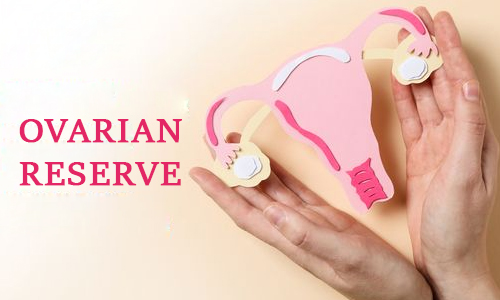What Is Ovarian Reserve?

The quantity of eggs in a woman's ovaries is referred to as her ovarian reserve. In the womb of her mother, a female fetus in her 20th week of pregnancy has seven million eggs. This amount gradually declines, and after birth, she possesses over 200,000 eggs. Of course, the number of follicles in a girl's ovaries is predetermined at birth.
One of these follicles releases an egg each month until the girl enters menopause, which happens when she reaches adolescence and her ovulation starts. Consequently, as she ages, her ovarian reserve rapidly declines.
Low Ovarian Reserve Symptoms
In the majority of cases, diminished ovarian reserve has no distinct symptoms .However, a reduced ovarian reserve diagnosis can be made through medical testing and physical examinations. Most ladies with low ovarian reserve exhibit the following symptoms:
1.Irregular Menstrual Cycles
2.Diminished Ovarian Response to Ovarian Stimulation
3.Elevated Follicle-Stimulating Hormone (FSH) Levels
4.Low Anti-Müllerian Hormone (AMH) Levels
5.Early Menopause
6.Early Menopause
Causes of Low Ovarian Reserve
Aging is one of the primary causes of decreased ovarian reserve. On the other hand, ovarian reserve may be reduced early in life due to certain causes. The following are the most typical reasons of reduced ovarian reserve:
- Smoking at an older age
- Excessive alcohol consumption
- Endometriosis
- Disorders of the tubercle
- Chemotherapy
- Radiation treatment
- Infections in the pelvic region
- Autoimmune conditions
- Genetic abnormalities
How Does Ovarian Reserve Impact Fertility?
Women's ovarian reserve naturally declines with age, which lowers fertility. This is due to the fact that women have a certain quantity and quality of eggs at birth, which decreases with age.
Reduced ovarian reserve can lead to higher risk of infertility and difficulties conceiving naturally. Decreased ovarian reserve in women can lead to greater rates of miscarriage, longer times to conceive, fewer successful pregnancies, and an increased risk of chromosomal abnormalities in the developing embryo.
While ovarian reserve is a significant factor, fertility is influenced by various other factors such as overall health, reproductive health, lifestyle, and underlying medical conditions. Additionally, individual responses to fertility treatments can vary. Women concerned about their fertility or ovarian reserve should consult with a fertility specialist for personalized advice and guidance.
Common Tests to Check Ovarian reserve:
Common tests for assessing ovarian reserve include:
1. Anti-Mullerian Hormone (AMH) Test
2. Follicle-Stimulating Hormone (FSH) Test
3. Estradiol (E2) Test
4. Baseline Antral Follicle Count (AFC)
5. Ovarian Volume Measurement
6. Clomiphene Citrate Challenge Test (CCCT or Clomid Challenge Test)
7. Gonadotropin-Releasing Hormone (GnRH) Agonist Challenge Test
Low Ovarian Reserve Treatment
While there is no specific cure for low ovarian reserve, several treatment options are available to help improve fertility or assist in achieving a pregnancy. It's important to note that the success of these treatments can vary from person to person, and not all individuals will respond in the same way. Here are some common treatment options are
In Vitro Fertilization (IVF): IVF is a common fertility treatment that involves retrieving eggs from the ovaries, fertilizing them with sperm in a laboratory, and then transferring the embryos into the uterus. This can be an effective option for women with low ovarian reserve because it allows for the use of assisted reproductive technologies.
Egg Donation: If a woman's own eggs are of poor quality, using donor eggs from a younger, more fertile woman may be an option. The donated eggs are fertilized with the partner's or donor sperm and implanted into the uterus.
Ovum Donation: In some cases, women may choose to freeze their eggs or use eggs that were frozen earlier when their ovarian reserve was better. This can be a proactive measure for women who anticipate declining fertility.
Hormone Therapy: In some cases, hormone therapy may be used to stimulate the ovaries and increase the number of eggs produced. However, the effectiveness of this approach may be limited in women with low ovarian reserve.
DHEA (Dehydroepiandrosterone) Supplementation: Some studies suggest that DHEA supplementation may improve ovarian function in women with diminished ovarian reserve. However, more research is needed, and it's important to consult with a healthcare provider before trying any supplements.
Lifestyle Changes: Maintaining a healthy lifestyle can positively impact fertility. This includes a balanced diet, regular exercise, avoiding excessive alcohol consumption, and not smoking.
Acupuncture and Traditional Chinese Medicine: Some individuals explore complementary therapies such as acupuncture and traditional Chinese medicine to support fertility.
It's crucial to consult with a fertility specialist to discuss individual circumstances and determine the most appropriate treatment plan based on factors such as age, overall health, and specific fertility challenges. Additionally, emotional support and counseling may be valuable throughout the process, given the emotional toll that fertility challenges can have on individuals and couples.
Blog List
WHAT IS A BLASTOCYST TRANSFER ROUTINE?
How To Improve The Quality Of Egg For IVF Naturally?
POLYCYSTIC OVARY SYNDROME DIAGNOSIS AND TREATMENT
6 Ways To Eliminate The Chances Of Infertility
How is the Infertility Journey for Non-Carrying Partners?
Fertility treatments lead to twins, triplets, or more
Difference between IVF and ICSI Treatment:
What is the Difference Between IVF and IUI?
Managing relationships during IVF
Polycystic ovary syndrome (PCOS) affects pregnancy
Understanding male infertility
Fertility Terminology & Abbreviations
Preimplantation genetic testing for genetic conditions
 Healthin
Healthin